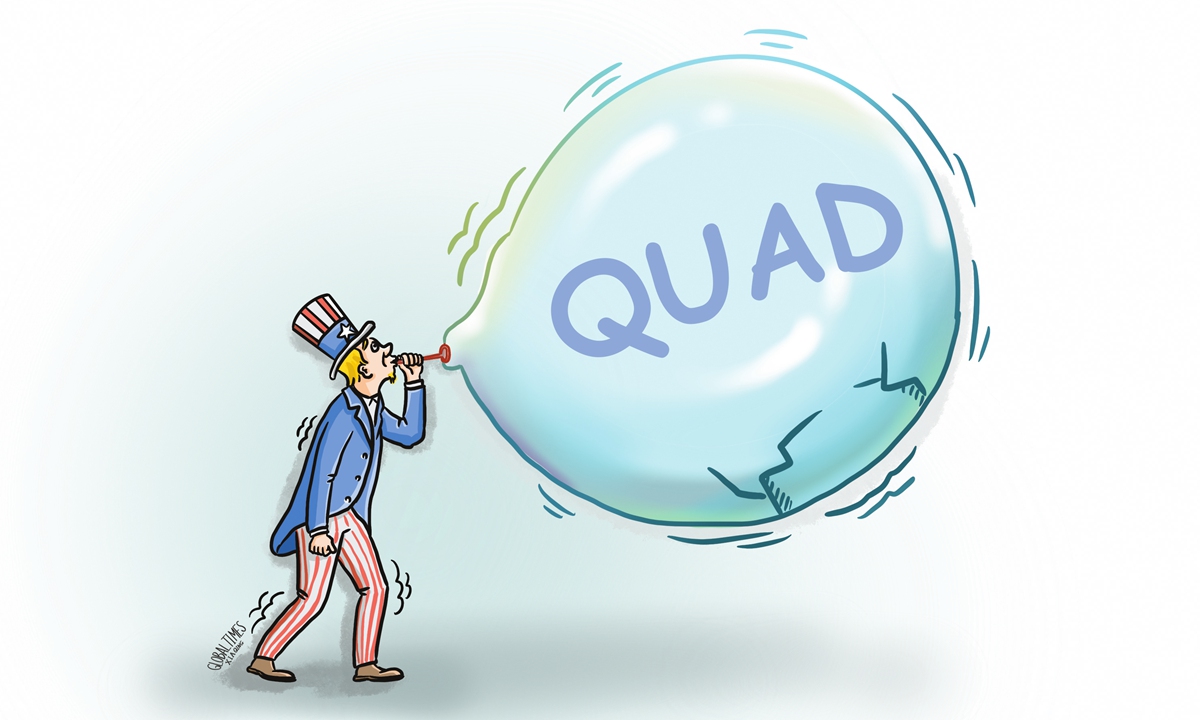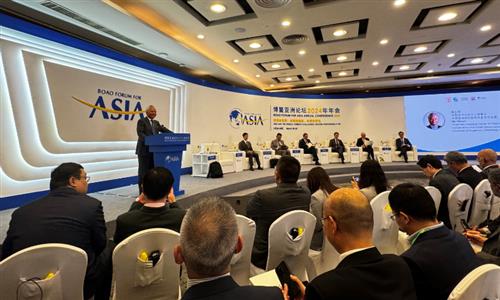
Illustration: Xia Qing/GT
Quad, the quadrilateral partnership among the US, Japan, Australia and India, has made no substantial contribution to regional development. Instead, it has caused resentment and dissatisfaction among other regional countries. It seems the bloc is headed for a dead end.
Foreign ministers of the four Quad countries were scheduled to hold a meeting on Monday. This event, which excludes the participation of ASEAN members, will happen right after the four attended the 14th East Asia Summit Foreign Ministers' Meeting in Laos. It is a clear violation of the Quad partners' so-called recognition of ASEAN centrality in multilateral cooperation in the region. The Monday meeting disregards the ASEAN member countries, and is an insult, and to some extent, a threat to them.
The formation of Quad was out of step with the times. Years after its formation, the group mainly worked as a mechanism for humanitarian assistance and disaster relief. At that time, regional integration seemed to be the mainstream. However, the restart of Quad in 2017 was clearly a counter-current move and still runs counter to the times as of today.
Quad's development does not meet the needs of regional countries. Economic development is their prioritized strategic choice for the vast majority of countries in the Asia-Pacific region, and even for the Quad countries except for the US. However, the grouping's efforts to strengthen security cooperation are out of step with the main concerns of countries in the region. This also fully demonstrates that security arrangements not in line with the common interests of these countries will not be supported and therefore will be difficult to achieve sustainable development.
Quad's layout creates a vacuum of geopolitical cooperation in the Asia-Pacific. To the ASEAN members, the security cooperation among these four countries, especially the joint maritime exercises, seems to be sending them a very clear signal that Quad is the decisive force dominating the regional security landscape. This has made ASEAN member countries feel strongly pressured. This is precisely why ASEAN put forward its own version of the "ASEAN Outlook on the Indo-Pacific" in 2019 in an attempt to hedge against the possible negative effects of Quad with a more inclusive and cooperative stance.
Furthermore, Quad has not worked well: Quad's military actions in recent years have resulted in an insecure regional situation. Both Australia and Japan are allies of the US, and both have become important henchmen to Washington in stirring up tensions in the region.
However, as the focus of the Albanese administration turns to developing its own economy and improving its relations with China, and India has further strengthened its strategic independence, the internal coordination in the Quad has become less efficient. It is precisely for this reason that although the Quad is a typical example of the US alliance system, it has fallen into an embarrassing situation.
Hence, it's fair to say that the Quad appears to be in a state of self-denial. At present, India, Japan and Australia are all paying close attention to and worrying about the changes in the political situation in the US. They are hesitant to invest more strategic resources and to carry out more provocative actions along with the Biden administration.
If the Quad can't promote regional economic development and benefit more regional countries, these countries will eventually cast the Quad aside. As the Regional Comprehensive Economic Partnership, the Comprehensive and Progressive Agreement for Trans-Pacific Partnership and many other bilateral free trade agreements increasingly highlight the effect of promoting regional economic and trade relations, the Quad will become even more unpopular with regional countries.
This mechanism has aimed to target China from the very beginning, but so far, it has failed. In the name of cooperation, these four countries have strengthened their strategic coordination, but they can't directly exert pressure on China. No matter what kind of large-scale joint actions these countries carry out, they will not be enough to deter China; instead, they only make other countries in the region feel threatened. It is precisely for this reason that the Quad has become a typical unsuccessful security alliance.
Cooperation between the US and other countries should be sufficiently inclusive in terms of members and issues before it can be recognized by regional countries. If the US continues to regard China as a strategic rival, any containment measures it takes in the Asia-Pacific region will not only fail to achieve the expected results, but will also frighten other countries in the region. Therefore, the Quad should refer to the norms of regional multilateral security cooperation mechanisms with ASEAN as its core. Otherwise, it will be directly replaced by these multilateral mechanisms in order to eliminate the doubts of other regional countries and to serve the interests of most countries in the region.
The author is a research fellow at Shanghai Institutes for International Studies. opinion@globaltimes.com.cn



